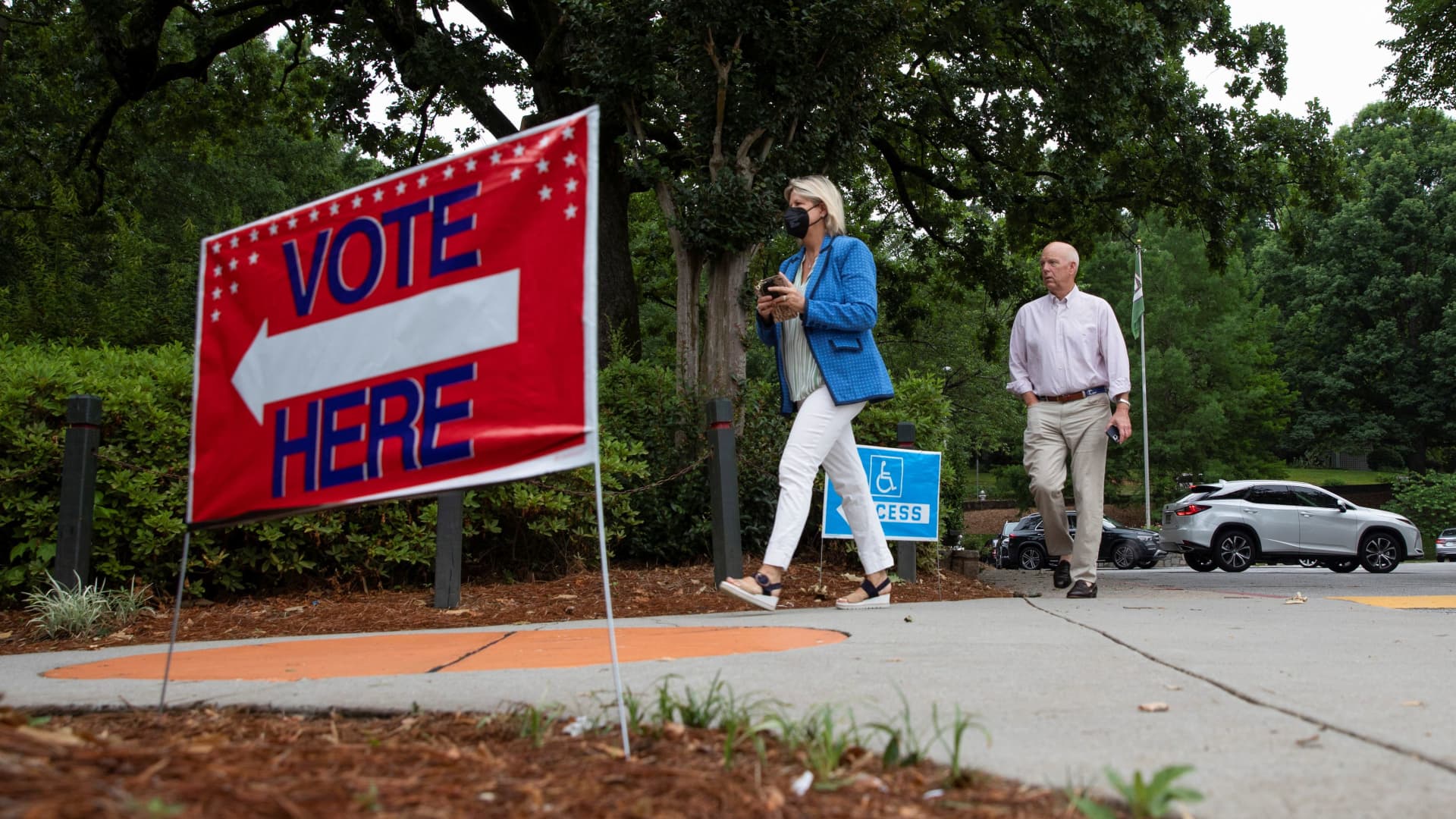A handful of massive corporations have received poor marks on how they have responded to a wide range of voting rights and democracy issues, including the Jan. 6 attack on the Capitol, according to a new report from a corporate accountability group.
Accountable.US, a 501(c)(3) nonprofit corporate watchdog, is releasing its American Democracy Scorecard, which grades the top 100 companies within the Fortune 500. Accountable.US has links to the New Venture Fund, a massive 501(c)(3) nonprofit group that often funds progressive causes. The New Venture Fund spent over $440 million in 2020, according to its latest 990 filing form, including a $1.4 million donation to Accountable.US.
The group gave a harsh assessment of how U.S. corporate titans have handled voting rights and democracy. Over 60% of the companies assessed received a failing F letter grade, according to scores first shown to CNBC and set to be made public this week.
Many of the other companies Accountable graded didn’t fare much better. Another 16% received a D letter grade, 5% got a C and 13% received a B grade. None of the companies got an A letter grade.
The companies that received an F grade include Comcast, the parent company of NBCUniversal, AT&T, Home Depot, Pfizer, Boeing and Verizon. Those who received a B grade from Accountable include Tesla, Apple, Citigroup and Bank of America.
“Americans overwhelmingly say corporations should stand up for democracy, yet we’re seeing the vast majority of major companies failing miserably,” Kyle Herrig, the president of Accountable.US, said in a statement to CNBC. Herrig plans to send letters to the CEOs of the 10 lowest scoring corporations.
He plans to tell the CEOs they’re “currently failing to stand up for democracy” but that “it is not too late to get your priorities straight and begin aligning your values with the values shared by most Americans,” according to a letter addressed to AT&T CEO John Stankey.
The new scorecard could put further pressure on companies to alter both their plans for the 2022 midterm elections and overall engagement on voting rights legislation.
The group’s grading methodology focused on fourteen criteria, including whether the company has supported lawmakers that opposed voting-related legislation, and whether the business donated to campaigns of Republican lawmakers who objected to certifying the 2020 presidential election.
Representatives for the companies named in this story did not return requests for comment.
The scorecard comes amid a flurry of questions about what role companies should have as Congress considers how to respond to the Jan. 6, 2021 attack on the Capitol and restrictive state voting laws.
Senate Republicans voted to block a sweeping pair of voting-rights bills in January. Democratic Sens. Kyrsten Sinema of Arizona and Joe Manchin of West Virginia then joined the GOP in opposing changes to the chamber’s filibuster rules, which could have allowed Democrats to pass legislation on their own.
An NBC News poll from August showed that 21% of respondents said “threats to democracy” is the most important issue facing the country just months before the midterms, a higher share than chose any other issue.
The scorecard also arrives as the House select committee investigating the origins of the Jan. 6 attack by supporters of former President Donald Trump aims to have additional hearings in September.
Over 140 Republican lawmakers moved to object to the results of the 2020 election after the Jan. 6 riot. House Minority Leader Kevin McCarthy, R-Calif., later told Reuters that he “agreed with objections that were made to two states, especially because constitutional questions have been raised about changes to election processes and whether these changes were approved by their respective legislatures, as required in Article II.”
Accountable says that as of Aug. 19, its review of Federal Election Commission filings shows that corporate political action committees have donated over $20 million during the 2022 election cycle to lawmakers who opposed voting legislation such as the Democrat-led Freedom to Vote Act.
Many corporations after the Jan. 6 attack said their PACs would stop contributing to campaigns of the objectors, or to lawmakers on both sides of the aisle. Some businesses have resumed donating to those campaigns.
At least $5 million have gone from corporate PACs to 2020 election objectors this cycle, Accountable’s data shows.
For instance, Accountable says Home Depot got a F grade in part because of its donations to federal lawmakers who opposed voting legislation and objected to the 2020 election certification. The group’s data shows that the company PAC has donated at least $845,000 to members of Congress who opposed federal voting rights legislation.
The report says that the Home Depot company PAC has donated at least $360,000 to lawmakers who objected to certifying the results of the election. The company said after Jan. 6 that it was ”pausing to take time to carefully review and reevaluate each of the members who voted to object to the election results before considering further contributions to them.”
